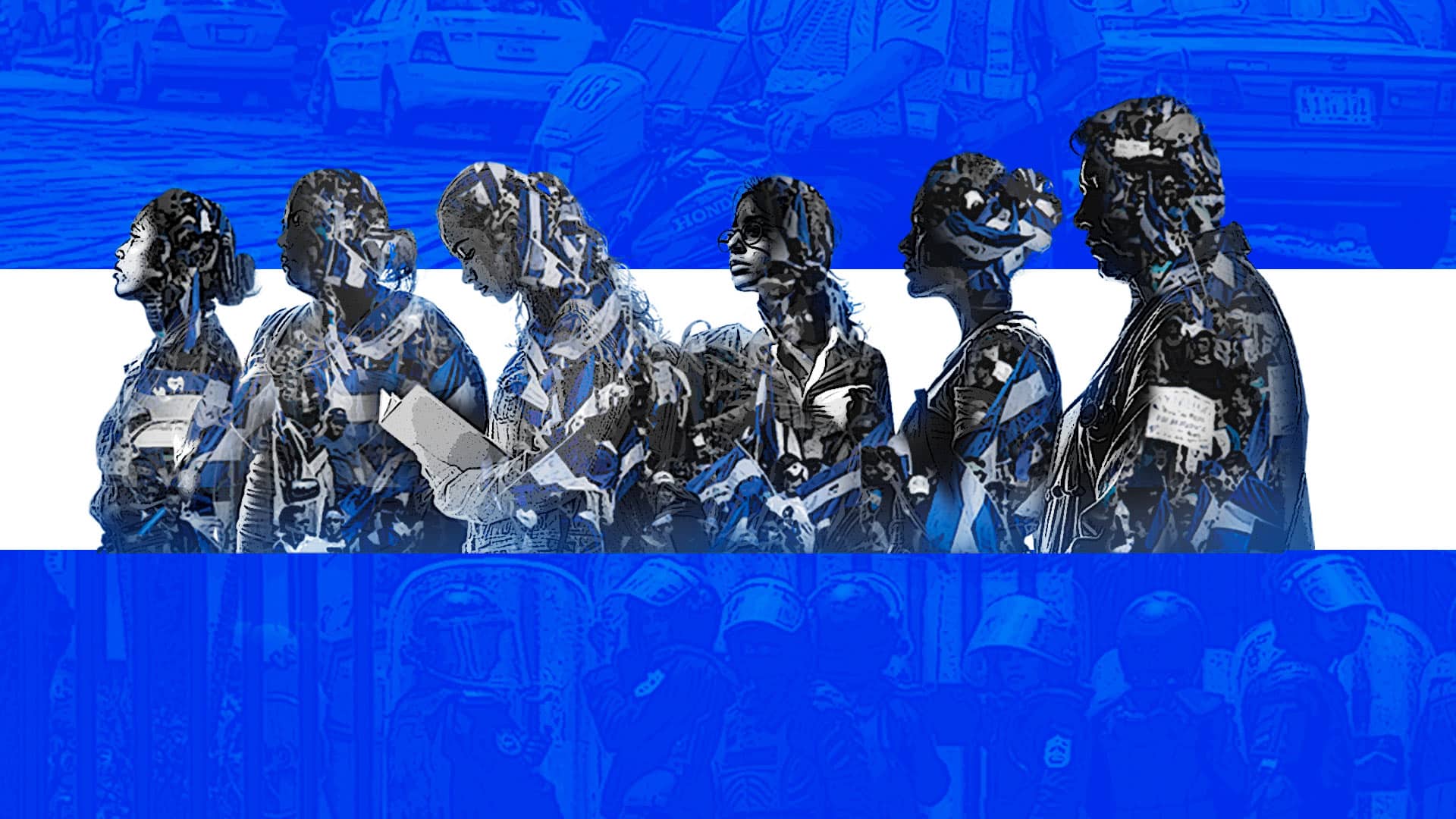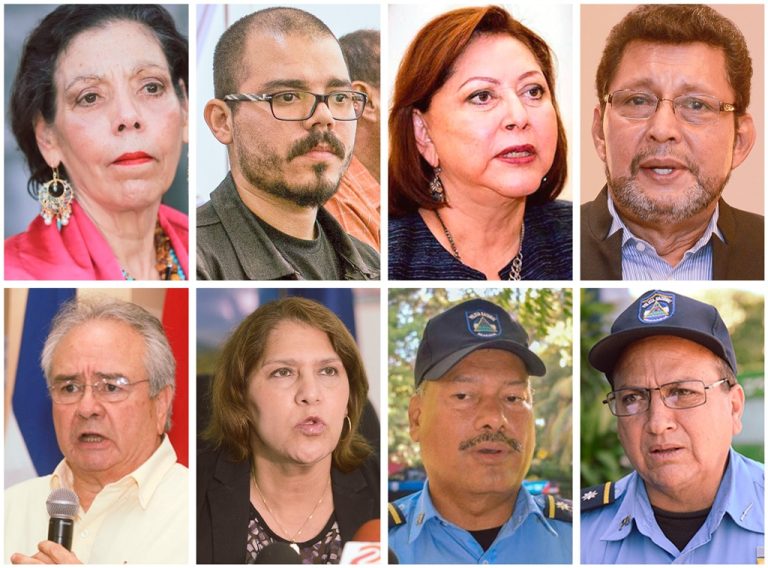4 de agosto 2021

Six Years With April in Tow: Life Under Nicaragua's New 'Normal'

PUBLICIDAD 1M
PUBLICIDAD 4D
PUBLICIDAD 5D
The list also includes Juan Carlos Ortega Murillo, Bayardo Arce, Gustavo Porras, Ana Julia Guido, Alba Luz Ramos, Fidel Dominguez, and Juan Valle

The list also includes Juan Carlos Ortega Murillo
The European Union (EU) sanctioned eight senior officials of the Nicaraguan regime on Monday, August 2, including the Vice President and First Lady, Rosario Murillo, as well as her son Juan Carlos Ortega Murillo.
The list is completed by Alba Luz Ramos Vanegas, president of the Supreme Court; Bayardo Arce Castaño, presidential advisor for economic affairs; Gustavo Porras Cortés, president of the National Assembly; Ana Julia Guido Ochoa, Attorney General; and Commissioners Fidel Dominguez Alvarez, Chief of Police in the department of León; and Juan Antonio Valle Valle, Chief of Surveillance and Patrol.
Those sanctioned have any of their assets in the EU frozen and, furthermore, EU citizens and companies are subject to the prohibition of making funds available to them.
The European Council, which brings together the member states, indicated in a statement that the restrictive measures are adopted against those eight individuals “as responsible for serious violations of human rights or actions that undermine democracy and the rule of law in Nicaragua.”
“These measures are directed against people and designed in such a way that they do not harm the Nicaraguan population or economy,” the Council stressed.
These eight high-ranking officials are added to six others of the regime who were already sanctioned by the EU, in May 2020. These are: the director of the National Police, Francisco Díaz, as well as Commissioners Luis Alberto Perez Olivas, Chief of the division that controls the El Chipote prison; Justo Pastor Urbina, Chief of Special Operations and Ramon Avellan, Deputy Director of the National Police. The list of those previously punished is completed by the close collaborator of the presidential couple, Nestor Moncada Lau, and the former Minister of Health, Sonia Castro.
The fourteen Nicaraguans are prohibited from traveling to the European Union countries, which prevents them from entering the community territory, even in transit.
Most of the fourteen sanctioned by the EU already appear on other lists of those punished by the Governments of Canada and the United States, who accuse them of acts of corruption and violations of the human rights of Nicaraguans.
However, this is the first time that a body sanctions the Supreme Court President, Alba Luz Ramos, and economic advisor, Bayardo Arce.
The EU highlighted that Ramos “is responsible for instrumentalizing the Judiciary to favor the interests of the Ortega regime, selectively criminalizing opposition activities and perpetuating the pattern of violations of the right to a fair trial, arbitrary detentions and disqualification of political parties and candidates of the opposition.”
In the case of Arce, the EU pointed out that he supported “the drafting” of legislation that prevents “opposition candidates from participating in the elections,” making him “responsible for repression against civil society and the democratic opposition in Nicaragua.”
The new round of sanctions comes three weeks after the European Parliament approved a resolution in which they reiterated their demand to expand specific and individual sanctions against human rights violators in Nicaragua, including President Daniel Ortega, Vice President Murillo, as well as “their inner circle.”
The resolution was approved by 629 votes in favor, 19 against and 40 abstentions. In the voting 688 of the 705 members of the European Parliament participated. In the document, the MEPs also asked that international organizations trace the money of the Ortega regime in the world, to protect the international financial system “against the illicit operations of the Ortega-Murillo regime and its collaborators.”
The levying of sanctions has been constantly demanded by Spanish MEPs Soraya Rodriguez Ramos and Jose Ramon Bauza, who also stressed that the EU has an “obligation” not to “recognize” the next Nicaraguan elections, because “we are not dealing with democratic elections.”
“At the Last plenary session I demanded sanctions for the Ortega family. Today, the Council takes a step forward and extends the list of sanctions to those responsible for human rights violations in Nicaragua. This is the way, wrote MEP Rodriguez on Twitter.
Meanwhile, Bauza celebrated the sanctions and wrote that “we are one step closer to justice. Europe will be the nightmare of Ortega’s tyranny. Let’s keep going!”
The legal framework to impose sanctions on citizens or companies in Nicaragua was adopted in October 2019, “after the Council repeatedly expressed its concern about the deterioration of the political and social situation in Nicaragua and firmly condemned the repression exercised since April of 2018 against political opponents, protestors, independent media outlets and civil society.”
For the EU to impose sanctions, the high representative of EU foreign affairs must present a proposal, which is analyzed in different authorities of each of the 27 member countries and the European Council, and afterwards it is passed for a vote of the foreign ministers, which must be unanimous.
The Council assured that the political situation in Nicaragua “has worsened even more in recent months” and added that “the political use of the judicial system, the exclusion of candidates from the elections and the arbitrary disqualification of opposition parties are contrary to basic democratic principles and constitute a serious violation of the rights of the Nicaraguan people.”
“These actions further undermine the credibility of the electoral process, already hampered by an electoral reform that did not comply with the recommendations of the electoral observation missions of the Organization of American States and the EU,” the EU asserted in its statement.
It recalled that the Union has “repeatedly” urged the Nicaraguan Government to comply with “its own commitments, the Nicaraguan Constitution and international laws and norms on human rights.”
“The EU has also repeatedly called for an effective dialogue with the opposition to be established on the adoption of electoral reforms as an essential step to restore confidence in public institutions, and for international human rights organizations to return to Nicaragua,” it added.
According to the EU, the sanctions show that the twenty-seven members “remain determined to use all instruments to support a democratic, peaceful and negotiated solution to the political crisis in Nicaragua.”
It reiterated its condemnation of “the systematic repression by the Nicaraguan authorities” and urged them to “repeal restrictive laws, including the Law to Regulate Foreign Agents.”
Likewise, it demanded the “immediate and unconditional” release of the political prisoners, as well as the full respect for human rights and the civil and political rights of all Nicaraguan citizens.
*With information from EFE
This article was originally published in Spanish in Confidencial and translated by Havana Times
Archivado como:
PUBLICIDAD 3M
Confidencial es un diario digital nicaragüense, de formato multimedia, fundado por Carlos F. Chamorro en junio de 1996. Inició como un semanario impreso y hoy es un medio de referencia regional con información, análisis, entrevistas, perfiles, reportajes e investigaciones sobre Nicaragua, informando desde el exilio por la persecución política de la dictadura de Daniel Ortega y Rosario Murillo.
PUBLICIDAD 3D